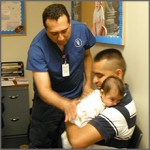 A woman’s decision to breastfeed typically occurs long before labor and delivery. But her commitment to carry through frequently hinges on the opinion of someone often overlooked in breastfeeding education—the baby’s father.
A woman’s decision to breastfeed typically occurs long before labor and delivery. But her commitment to carry through frequently hinges on the opinion of someone often overlooked in breastfeeding education—the baby’s father.
“If the father is indifferent, the mother will breastfeed some of the time, but when the father is pro-breastfeeding, she will breastfeed almost all of the time2,” says Muswamba Mwamba, IBCLC, a peer dad coordinator at the City of Dallas Woman, Infants and Children Program (WIC) Program.
A father’s participation in the decision to breastfeed, his awareness of the health benefits for mom and baby and his approval are critical to a mother breastfeeding after leaving the hospital, particularly for women with lower incomes.
That’s why the city of Dallas is investing resources in programs that include fathers in breastfeeding education, such as its Peer Dad Program. The Peer Dad initiative pairs future fathers—identified through women receiving services in the clinic—with WIC-trained peer mentors, all fathers of breastfed babies whose partners were enrolled in WIC. The peer dads are trained to inform, coach and offer support.
“Breastfeeding can be difficult for a mom in the beginning,” says Deborah Parnell, breastfeeding coordinator for the City of Dallas WIC Program. “This is when dads can be most helpful and where education received in the Peer Dads program can make a difference; making dads aware of ways they can help mom and make the process easier.”
